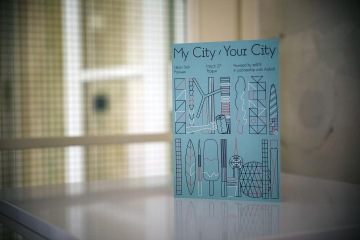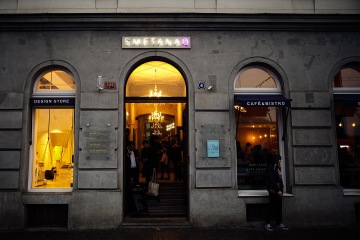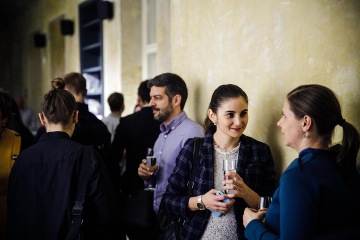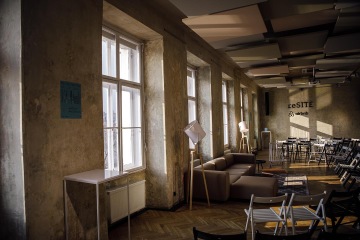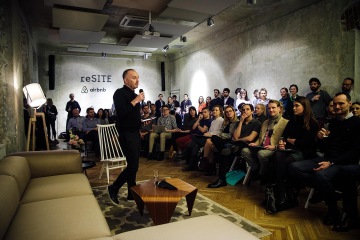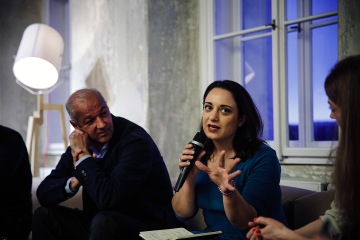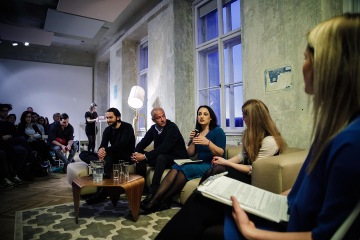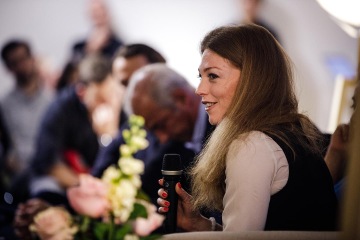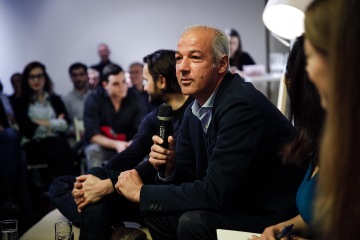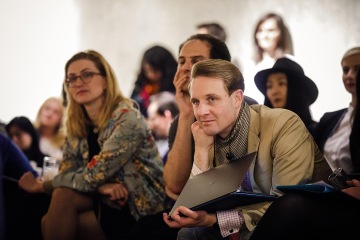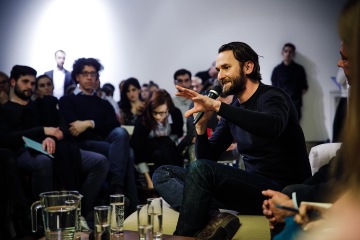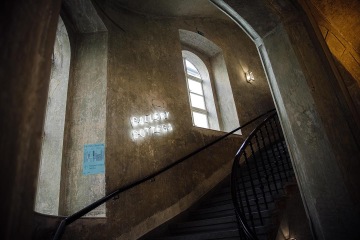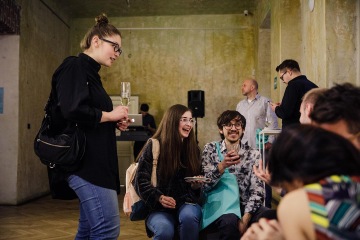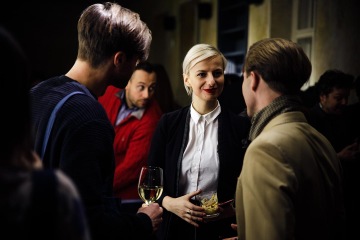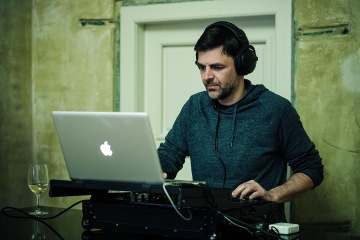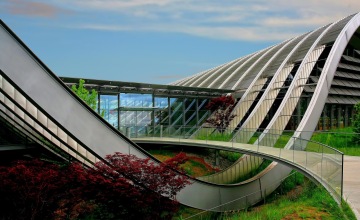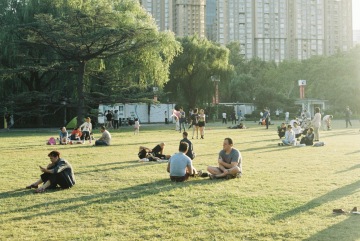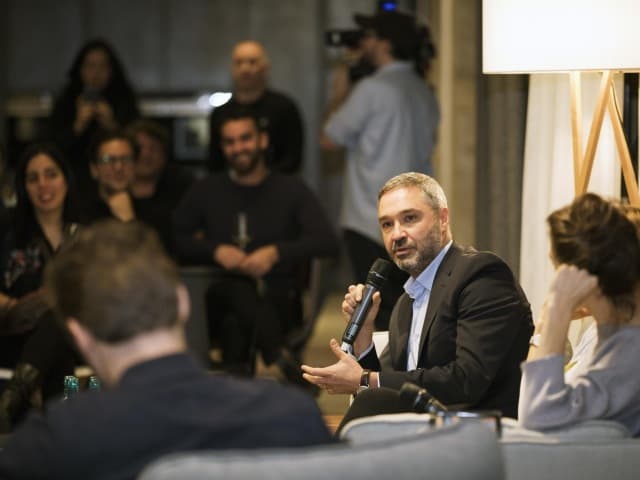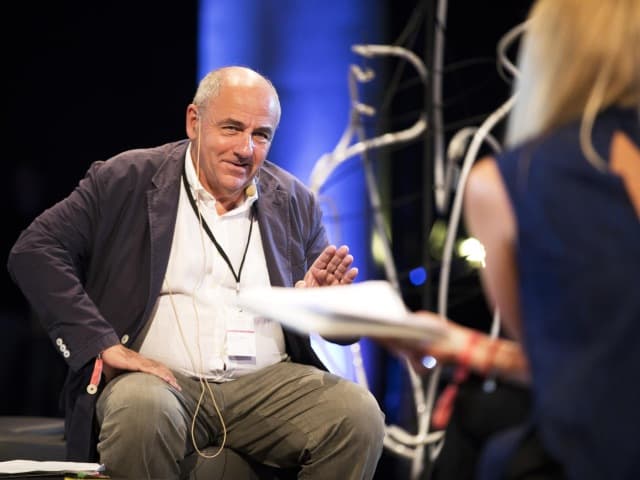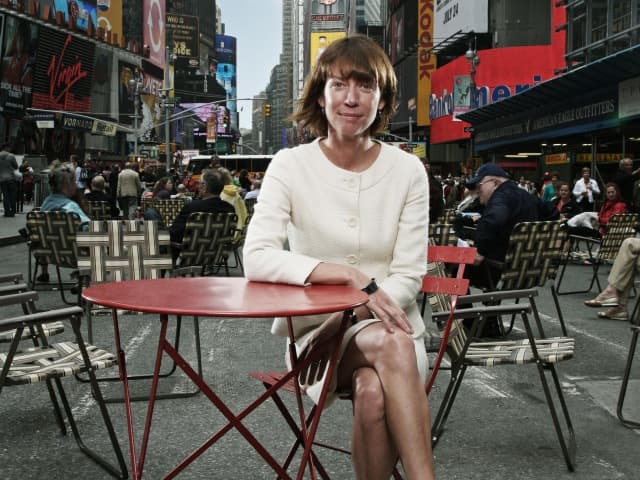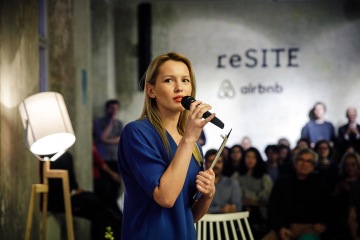
My City / Your City Salon #2 in Prague
All roads lead to innovation and to another full house for reSITE's second salon created in partnership with Airbnb called Urban Tech Pioneers
"How do we make our voices heard more effectively and push for the change we believe will make our cities better?" Sofia Gkiousou of Airbnb posed the essential question of the evening.
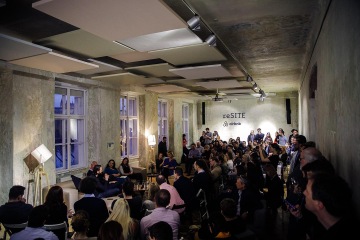
"reSITE is not interested in just urbanism or architecture or policy or sharing economy. We are interested in all of it. Innovation, ideas and creativity really happen at intersections. They happen at the crisis points," Martin Barry opened the evening.
Four international tech innovators from living, mobility, quality of life and startup scenes from all corners of Europe spoke at the second sold-out evening salon from our collaborative “My City / Your City” series happening at the SmetanaQ Gallery, Prague. Moderated by the Czech television news anchor Linda Bartosova, they discussed about the potential of technology for cities and the quality of life, with over 150 visitors in the audience.
Airbnb uses technology to connect people and create economic opportunities but also connect them so they actually have offline experiences.
Sofia Gkiousou, the Regional Policy Manager for Airbnb, discussed how to create community through sharing while Creative Dock Founder, Martin Pejsa talked about technology alternatives creating decentralized economies. Szilvia Walter, co-founder of EVA Visual Assistant, is commited to creating technology to give independence to those with visual impairments. Invest Lisboa's executive director Rui Coelho spoke from the perspective of a policy maker whose agency changed Lisbon for the better.
Several provocative thoughts surrounding the leveraging tech for the better, and the implications of centralization were discussed during the second evening Salon held in Prague, made possible thanks to Airbnb.
Tech facilitates putting the local into the global - locally relevant but globally accessible
Sofia Gkiousou continued the conversation on sharing as a tool for connection and creation of community: "If there is one insight gained from company: the more people travel, the more they become understanding, tolerant, and curious about other people and cultures." Playing on Martin Barry's opening comments, "Cities aren’t about tech, they’re about people."
Airbnb believes in diversity of accommodations. The idea of healthy tourism is providing diverse options that are also healthy to the locals. Sofia pointed out that hosting helps many people to keep their homes and added some numbers:
"By 2030 in Prague there will be 93,000 new people but only 4,000 homes per year. The ability for people to share the extra capacity becomes critical in allowing people to stay where they want to live."
Technology doesn’t mean anything if we aren’t improving people’s lives.
The discussion was mostly concentrated around the question of how we use technology to reinvent what it means to share, asking questions that stimulate the positives and address the negatives, with the common thread that technology doesn’t mean anything if we aren’t improving people’s lives.
We are focused on projects that push for the decentralization and personal autonomy.
From being able to sell your own data to investing in home-installed solar energy panels and creating charging stations on your property, Martin Pejsa, the Founder and CEO of Creative Dock based in seven cities used examples of projects currently in production. Creative Dock works to materialize ideas that aim to bring that autonomy to the people through tech.
By leveraging technology in the sharing economy and peer to peer platforms, economic power can be returned to the people. He stressed that tech can often cause a centralization of wealth, thus seeking creative ways to counter that by creating more personal autonomy through sharing is essential to creating a safe city.
Martin Pejsa predicts that B2C and C2C models in sharing mobility - the first one being more common for short rides while the second tends to serve longer trips - will become closer and more widespread. "This is very important to create healthier cities," he said.
We believe in giving visually impaired people independence in order to remove the distinction between those with visual impairments and those without.
Accessiblity takes on another form, as EVA Visual Assistant's co-founder Szilvia Walter discusses the company's work on making urbanized living better for those whom have visual impairments or blindness. By giving those with disabilties independence, the gap of inclusivity is shortened. Walter also stressed that technology shouldn’t only work in smart cities, but in any city. The idea is to find the right access points.
What is the difference between a guide dog and AI? It costs 60,000 euros to train a seeing-eye dog. Although the technology doesn't substitute the emotional value of the animal, it is much more accessible. Szilvia believes that the first wearable glasses developed by EVA could hit the market by the end of 2018.
I consider myself very lucky: our intention is to create jobs. Support more and more entrepreneurship.
Rui Coelho thinks that the massive growth in the sharing economy demonstrates a growing need for flexibility, simplicity, easy access, lower costs and sustainability. The innovative companies and startups – the business community – were fast in taking advantage of technology to the development of new business models in response to those new consumer desires. He considers himself a huge fan of the EU. "I know it’s not sexy to say this but i have to explain: suddenly we are able to unite countries and negotiate things. This is the way to move forward and there is no other way. This is the starting project of uniting the world," he said. No urban challenge can be solved alone.
When it comes to innovation, all roads lead to cities.
The people - the users of technologies, inhabitants of our cities and clients of smart services - were at the heart of the discussion. They are the ones who define the needs and desires, they are the ones who provide feedback, they are the ones who will benefit from their impacts.
Martin Barry, the host of the evening, added that besides the social impact, reSITE is interested in the spacial impact those innovations will implicate for our public spaces and the way we design our cities. The urban environment will change considerably when sharing and autonomous mobility will dominate.
Many more discussions continued during an informal after party that allowed the speakers and guests to mingle amongst each other and enjoying the beautiful Prague views.
Photographs © Tomas Princ, reSITE
#reSITEsalon on Social
The #SharingEconomy phenomenon demonstrates a growing desire for people to connect with each other - in #Prague, #CEE region and beyond. #reSITEsalon #MyCityYourCity #tech #innovation @reSITE_ @Airbnb pic.twitter.com/bwGi3SN76R
— Vladimír Beroun (@VladimirBeroun) March 27, 2018
Cities, technology, people, sharing economy, politics - event by @reSITE_ #Prague pic.twitter.com/oNosG7kqXo
— David Ondráčka (@David_Ondracka) March 27, 2018
Martin Barry from #resite is startung #mycityyourcity #prague with #airbnb and we are here @beprague pic.twitter.com/e2Iw4Vvrdc
— IdeaSense.cz (@ideasensecz) March 27, 2018
Very happy to be on a panel with fascinating people today to talk about tech innovation and quality of life - thank you @reSITE_ #belonganywhere #airbnb #weaccept pic.twitter.com/cAqXTnfMS8
— Sofia Gkiousou (@sofiagk) March 27, 2018
Related Stories
Five Talks On Using Design for Social Impact
Socially conscious designers leverage economic, environmental, political and cultural factors and consider them in their efforts to improve the livability of the built environment.
Six Talks on Designing Cities to Include Greenspace
Cities benefit tremendously from the incorporation of greenspace, a connection to nature that is an arena to cultivate community.
Four Talks on Smart Cities: Do They Enhance or Weaponize our Environment
Technology is embedded in contemporary cities. From surveillance cameras to street lights, architects, scientists, planners, and engineers are finding new ways to streamline urban environments to improve the quality of life. Yet, some worry that increasing reliance on technology could lead to its potential abuse, especially when it comes to personal privacy.
Women Make Cities: Five Talks by Women Who Are Shaping the Urban Environment
Within the fields of architecture and urban planning, women are making their case for creating built environments that serve all genders. To close the gap of gender inequality and make spaces more inclusive and safe for women, the unique perspective provided by these speakers is essential to augmenting our idea of design. To move towards more inclusive cities, women must be at the forefront of change.
Related Talks
My City Your City: Berlin
reSITE Berlin Salon in partnership with Airbnb draws a full house
Jean-Louis Missika on Redefining Urbanism in Paris
Jean-Louis Missika, Deputy Mayor of Paris, participates in a discussion on his projects to reinvent Paris through various initiatives and chagnes. He believes that public space is the future, and is shifting towards increasing and improving this space.
Janette Sadik-Khan on the Value of Our Streets + PlaNYC
Janette Sadik-Khan, former Commissioner of the Department of Transportation of New York City, discusses programs implemented in her time in the department and the positive changes these have made. She especially focused on safety and community opinion in her policies, and presents how they made safety programs appeal to people and how much safer she made the streets for pedestrians, cyclists, and drivers.
Caroline Bos on Building Cities for the Future
Caroline Bos, a Dutch urban planner and co-founder of the architectural design center UN Studio, questions the sustainability of our current cities and how to make them last into the future. She brings up ideas of resilience in cities, working with a circular economy, and managing resources more sustainably and effectively.
